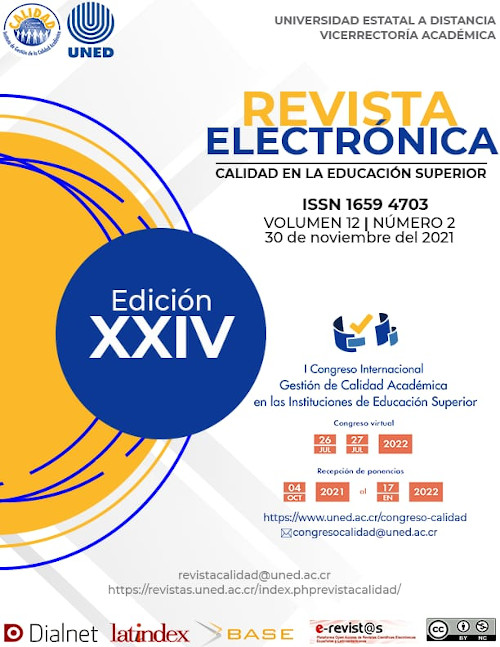Developing English for Specific Purposes (ESP) Courses in IT: A Narrative Experience of the Universidad Técnica Nacional
DOI:
https://doi.org/10.22458/caes.v12i2.3854Keywords:
ESP, Course Design, Technology, Teaching English, ICTAbstract
The importance of English and technology for the workplace increases the need of higher education schools to develop and promote English for specific purpose (ESP) programs that provide students with both effective communication competences and digital skills to prepare them for their professional development. Consequently, it has become a great challenge for English educators to look for innovative techniques to improve these two competences based on the activities that are relevant and typical to their profession and context. The preset work aims to share a one-year experience in the design and development of three-course program on English for technology, for the English as a Second Language Program at Universidad Técnica Nacional.
References
Bao, D. (2015). Materials in the ELT Classroom: Development, Use and Evaluation, pp. 37-52. The European Journal of Applied Linguistics and TEFL Vol 4. Retrieved from http://thecreativitygroup.weebly.com/uploads/5/0/9/2/50924157/dat_bao_-_flexibility_in_second_language_materials.pdf
Botha, E. (2009). Why metaphor matters in education. South African Journal of Education. Vol 29:431-444. Retrieved from https://files.eric.ed.gov/fulltext/EJ1147086.pdf
Colantuoni, S. (2020). The Importance of Foreign Direct Investment in Costa Rica. Retrieved from: https://www.thecentralamericangroup.com/foreign-direct-investment-in-costa-rica/
Dudley-Evans, T. & St. John, M. J. (1998). Developments in ESP-a multi-disciplinary approach. Cambridge: Cambridge University Press. Retrieved from https://books.google.co.cr/books?id=FY5ChNRKtxwC&printsec=frontcover&hl=es&source=gbs_ViewAPI&redir_esc=y#v=onepage&q&f=false
Goodman, B & Stvivers, J. (2010). Project-Based Learning. Educational Psychology. Retrieved from http://www.fsmilitary.org/pdf/Project_Based_Learning.pdf
Hyland, K. (2008). English for Academic Purposes An Advanced Resource Book. Retrieved from https://www.pdfdrive.com/english-for-academic-purposes-e25422578.html
IELTS - The International English Language Testing System | Take IELTS. (2020). Retrieved from https://takeielts.britishcouncil.org
Lesiak-Bielawska, E. (2015). Key Aspects of ESP Materials Selection and Design. English for Specific Purposes World, ISSN 1682-3257. Retrieved from http://esp-world.info/Articles_46/ESPmaterialsLesiak-Bielawska.pdf
Nguyen, T. T. (2017). Developing important life skills through project-based learning: A case study. The Normal Lights, 11(2), 109 – 142. Retrieved from https://pdfs.semanticscholar.org/d85d/6dbedf4ebf63c425fca4c929441857409b9b.pdf
OECD (2018). Getting Skills Right: Australia. OECD Publishing, Paris. Retrieved from https://books.google.co.cr/books?id=-sRqDwAAQBAJ&printsec=frontcover#v=onepage&q&f=false
Sharma, P. (2009, April 8). Controversies in using technology in language teaching. Retrieved from http://www.teachingenglish.org.uk/articles/controversies-using-technology-language-teaching
Solomon, G. (2003). Project based learning: a Primer. Retrieved from https://free.openeclass.org/modules/document/file.php/ENG155/Projects%20online/PBL-Primer-www_techlearning_com.pdf
UNESCO. (2018). A Global Framework of Reference on Digital Literacy Skills for Indicator 4.4.2. Retrieved from http://uis.unesco.org/sites/default/files/documents/ip51-global-framework-reference-digital-literacy-skills-2018-en.pdf
UTN. (2019). Inglés como lengua extranjera. Retrieved from https://www.utn.ac.cr/content/inglés-como-lengua-extranjera
Downloads
Published
How to Cite
Issue
Section
License
Esta revista provee acceso libre inmediato a su contenido bajo el principio de que hacer disponible gratuitamente la investigación al publico, lo cual fomenta un mayor intercambio de conocimiento global.
